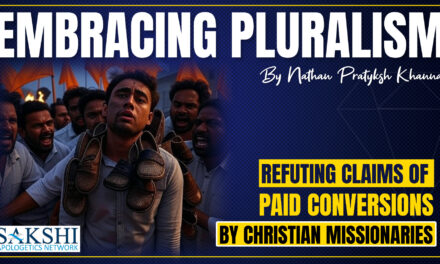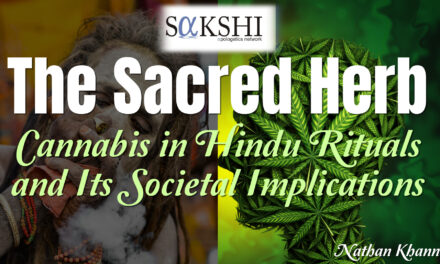 In the first and second rebuttals in this series, G Bibu refuted the so-called simiarlities between Christ and Krishna. In this third article, G Bibu demonstrates how Stephen Knapp’s theories and contentions are actually groundless and futile.
In the first and second rebuttals in this series, G Bibu refuted the so-called simiarlities between Christ and Krishna. In this third article, G Bibu demonstrates how Stephen Knapp’s theories and contentions are actually groundless and futile.
THE THEORIES:
According to Mr. Knapp, there are several theories about how the stories of Christ and Krishna came to be so similar. Let us examine some of these theories and contentions now.
1. Mr. Knapp says:
"Of course, there are different theories about how this happened. One theory is that when the Christians went to India, they found out that this story was there in the Bhagavat-Purana; so, they immediately had to change the date of when the Bhagavat-Purana was supposed to have been written. So now the historians generally say that it was written about 1400 years ago. Otherwise, how could they explain the story of Krishna’s birth being so similar to the story of Christ’s birth? They thought that the Vedic pundits must have heard about the story of Jesus and adapted the story to their own incarnation, as if the Vedic scholars would demean themselves by putting a story into their scripture that was heard from people who were considered low-born foreigners. Actually, what happened was just the opposite".
MY RESPONSE:
There are three questions we raise here which render the above excerpt meaningless:
A. The Christians who came to India might as well have tampered with the content of the Vedic literature, than to merely mess around with the date of their authorship. If they had the power to effect the latter, they would have comfortably resorted to the former also, which would have better served their interest of suppressing the Vedic Literature, and thereby defending the Biblical Accounts from the charge of plagiarism from the Vedic Stories. Why didn't they do so?
B. If the Christians changed the date of authorship of the Vedic Literature, can Mr. Knapp produce as an evidence to this charge he lays against the Christians, a single copy of any purana or Veda in a complete shape as they stand today, dating prior to the year 800 A.D, and thereby prove that any of these documents existed earlier than about fourteen Hundred years from now? If the story of Krishna is thousands of years older than that of Christ as Mr. Knapp claims, why is it that the earliest documents containing the story of Krishna as now available are dated not less than Five Hundred years after the oldest available manuscripts of the Bible?
C. If the "Vedic Scholars" would not demean themselves by putting in to their scriptures what they heard from the "Low-Born foreigners", would the Christians have been so naive and credulous to confound themselves and blaspheme their God in putting in to their Scriptures, a story heard concerning a Low-born deity (morally not racially) such as Krishna, so as to confuse him with the Holy One of the Bible?
We urge the reader to give a serious thought over the questions we raised above, and be honest to himself in finding proper answers thereto.
2. After citing other scholars who more or less seem to concur with his contention as quoted above, Mr. Knapp complacently states:
"So, the conclusion we must arrive at is that the story of Lord Krishna's birth, along with numerous other parts of the Vedic philosophy, must have come to the mid-eastern part of the world because of the many trade caravans going back and forth at that time from India to the region of Palestine".
MY RESPONSE:
A. Mr. Knapp does not take pains here to show why one should necessarily conclude that the "Trade Caravans" from India, must have brought the Vedic knowledge in to the middle east. Why may we not conclude instead, that they may have brought back with them as they returned to India, the knowledge of the Bible as they may have acquired while they sojourned in the Middle-East, thereby influencing the Vedic philosophy with Biblical concepts? What are the grounds of the presumption in favor of the alleged export of knowledge, as against the possibility of its import, by these "Trade Caravans"?
B. It is the heights of ignorance to imagine that the Trade-Caravans from India might have heralded the Vedic stories in the Middle-east, since we are alluding here to such an era in the history of India, when the "Varnasrama Dharma" (The Cast Based Duty), was followed as an absolute watertight rule, so that one cast cannot perform the duty of another cast. The Trade-Caravans would therefore of necessity consist of the "Vaishyas", whose duty it was to confine themselves to Trade and Commerce. It was the duty of the "Brahmans" to expound the Vedas and to teach religion. Hence the assumption, that the Trade-Caravans from India, had among other wares, also the Vedic knowledge to export in to the Middle-East, is absolutely groundless.
3. Resting complacently upon such baseless assumptions, Mr. Knapp goes on to Conclude:
"Since there were no real witnesses of Christ's birth and hardly any history in the gospels of the life of Christ up to the age of thirty, it is likely they applied the story of Krishna to Jesus’ life. Otherwise, there is little historical evidence that any of it is factual".
MY RESPONSE:
A. Mr. Knapp wants us to believe that the Christians applied the story of Krishna to the birth and life of Christ, because there were no witnesses to the birth of Christ, and no history in the Gospels about the life of Jesus until the age of thirty. However, he does not take pains to show what historical evidences could these early Christians find to believe the stories of Krishna to be true, in so much that they were persuaded thereby, even to superimpose the story of Krishna in to the Gospel accounts of Jesus' birth and life. Perhaps Mr. Knapp had forgotten to furnish for our consideration, these historical evidences which substantiate the life of Krishna, and if so, here is the reminder to do so.
B. We claim with much confidence, that there is much more historical evidence to the life of Jesus and to the truth about His presence on earth at a certain point in history, than that of Krishna, or any other deity which Mr. Knapp finds enlisted in the Vedas.
For instance, Tacitus (55-120 A.D), a non-christian Roman historian, recorded that the person, Jesus of Nazareth, lived and was crucified. He wrote:
"But all human effort, all the lavish gifts of the emperor, and the propitiations of the gods did not banish the sinister belief that the conflagration (the burning of Rome) was the result of an order (from Nero, himself). Consequently, to get rid of the report, Nero fastened the guilt and inflicted the most exquisite tortures on a class hated for their abominations, called Christians by the populace. Christus, (Christ Jesus) from whom the name had its origin, suffered the extreme penalty during the reign of Tiberius at the hands of one of our procurators, Pontius Pilatus, and the most mischievous superstition [Christianity] thus checked for the moment, again broke out not only in Judea, the first source of the evil, but even in Rome, where all things hideous and shameful from every part of the world find their center and become popular. Accordingly, an arrest was first made of all who pleaded guilty; then, upon their information, an immense multitude was convicted, not so much of the crime of firing the city, as of hatred against mankind. Mockery of every sort was added to their deaths. Covered with the skins of beasts, they were torn by dogs and perished, or were nailed to crosses, or were doomed to the flames and burnt, to serve as a nighty illumination when daylight had expired. Nero offered his gardens for the spectacle, and was exhibiting a show in the circus, while he mingled with the people in the dress of a charioteer or stood aloft on a car. Hence, even for criminals who deserve extreme and exemplary punishment, there arose a feeling of compassion; for it was not, as it seemed, for the public good, but to glut one man's cruelty, that they (the Christians) were being destroyed."
Hence, complementing the Biblical information, even secular historic sources which date close to the life of Jesus on earth agree, that the man called Christ was crucified under the jurisdiction of Pilate and that his followers died under extreme torture holding to the conviction that Jesus both died and rose again. Can Mr. Knapp produce any such historical accounts, dating close to the actual time of Krishna's life on earth, that someone named Krishna, who was born to vasudeva, and who waged wars against asuras (the Demons), romanced around with Gopikas (the shepherd-girls), reigned over Mathurah, revealed the Geetha, etc, had actually lived on this planet at some point in history, and that some thousands of years ago, as Mr. Knapp claims?
C. Next Mr. Knapp wants to suggest, that Krishna's story was relied upon by the Christians, just to makeup for the missing information in the Gospels about Jesus' life until His age of Thirty years. But he fails to realize that if the Christians had actually made-up for the missing information, he would never have known that it was missing, to start with. The fact is that the Gospels even as they stand today, do not carry much information about the life of Christ until His thirty years of age, except about His birth and a few events in connection thereto, and just one event when He was twelve years of age, and of these accounts, we have already established in the first part of this series, how the presumption of these being borrowed from the story of Krishna does not really hold water. And what's more, the missing information is still missing, and hence the question of the Christians having made-up for the missing information does not even arise.
4. Ere we conclude this article, we must focus on certain statements of Mr. Knapp, wherein he hurls some personal insults on the Christian missionaries from the west. He states:
"We must remember that when the Christians first came to India to preach, they were not very well received by the local people. There was very little penetration because the Christian priests and missionaries were seen for what they were: mlecchas and yavanas, more or less unclean cow-killers or untouchables in local terminology. So it is doubtful that the Vedic pandits spent much time even listening to them, what to speak of writing scripture or changing the story of Krishna's birth on account of hearing these missionaries. Of course, now as Indian society has deteriorated and become more attracted to Western values (partly due to being indoctrinated by the British rule years ago), Christianity is more easily accepted."
MY RESPONSE:
A. It must be carefully noted here, that Mr. Knapp is not simply giving us to understand the attitude of the native Indians against the missionaries who first came to India. This is infact his own hate-speech against the Christian missionaries, which is confirmed by his expression, "The Christian preachers and missionaries were seen for what they were". In other words, this is what he believes they were, viz. "mlecchas and yavanas, unclean cow-killers or untouchables".
B. If the Christian preachers and missionaries who brought Christianity to India were unclean and untouchable because they were cow-killers, as provocatively stated by Mr. Knapp, what shall we say about the native Hindus who worshipped a deity that incarnated to be a pig (the Varaha Avatara), and who were whore-mongers themselves (by virtue of the Devadasi System)? Were they touchable? Were they clean? What would the Christians have found worth borrowing from such a religion, so as to defile the holy Bible therewith? And what about Indra, the most prominent god during the Vedic age, who is known as a voracious eater of cows and bulls? (See Rig Veda, 10-28-3). Was he clean? Was he touchable?
C. Mr. Knapp loosely comments that the Indian societies have deteriorated to embrace western values, which is why Christianity is more readily accepted now a days. But he dares not mention the specific areas of such "Deterioration". However, a candid reader who has a fair idea of the "Virtuous Practices" under the orthodox Hindu faith knows that this "Deterioration" includes the abandoning of practices like the "Sathi" (the burning to death of a widow along with her dead spouse), the "Devadasi system" (the sublime temple prostitution), the abuse of a fellow-human in the name of the oppressive cast system, etc. And we understand that Mr. Knapp is just saying what every orthodox Hindu would say, for they view the breaking asunder of such shackles as deterioration, in that it emancipates their deluded captives from their superstitious and ruinous influence. But the Christian missionaries brought the truth to the poor deluded souls in India, and true to the words of Jesus, they have known the truth, and the truth has set them free (John 8:31-32). If this is "Deterioration", so be it.
CONCLUSION:
So much for Mr. Knapp's "Theories!". However, Between the contentions made and conclusions drawn by Mr. Knapp, which we have considered and confuted above, he is careful to furnish a few excerpts from other scholars, besides a few other evidences and arguments adduced by him, to make for his case. These excerpts and evidences are someth
ing which he might perhaps have counted on as facts which authenticate such concoctions and conjectures as advanced by him, and which most certainly may appear for a casual reader to bolster his observations as true and reliable. But we urge the reader to consider afresh, these excerpts and evidences as we deal with them in our next article.
{moscomment}




